Tech is facing layoffs again. Over 240,000 jobs vanished last year, and last year’s tech-wide reckoning continues.
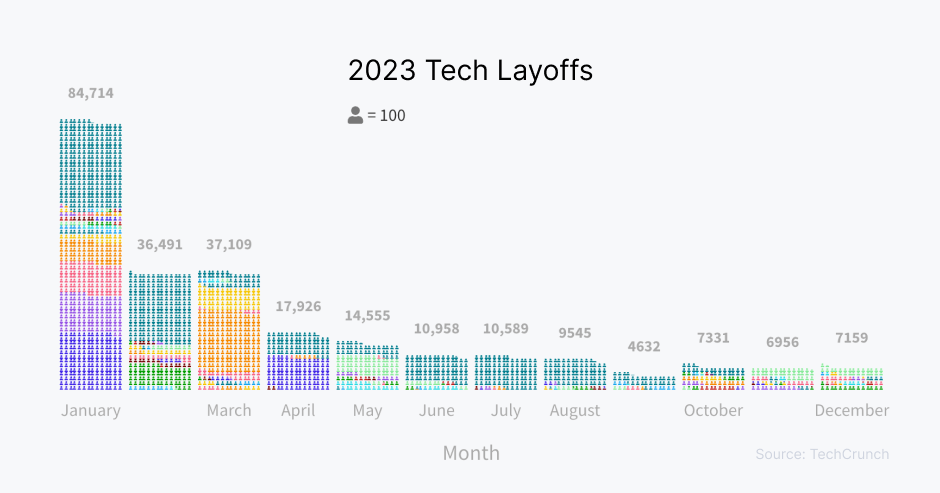
Cuts are escalating; Google, Amazon, Twitch, Microsoft, and eBay are trimming staff. Microsoft sheds 1,900 post Activision Blizzard acquisition. eBay trims 9%, impacting 1,000. Even startups announce cutbacks.
Widespread layoffs cast skepticism over job security and industry growth. News and social media paint a gloomy picture of decline. However, tracking these layoffs unveils impact on innovation: which companies are facing tough pressures and who's available for hire amid growth.
In the next 11 months, change is on the horizon. Robert Half reports 57% of hiring managers planning new positions in H1 2024. Strong demand for talent acquisition pros is anticipated. HR decision-makers and recruiters, 86% positive, foresee a bright recruiting future, per Jobvite.
Straight to the point: Tech jobs will thrive in 2024 and beyond. Dispel the notion that it's a bad time to enter tech. Discover the 5 pivotal tech hiring trends, altering how companies in tech source, evaluate, hire, and retain their workforce, impacting tech talent.
Skip the talent struggle. Connect with seasoned, expertly vetted tech talent effortlessly. Find your match in just 48 hours →
There Is Still a Strong Market for Tech Hiring
Companies, even those undergoing workforce reductions, prioritize hiring skilled tech professionals. Job gains in tech surpass losses, maintaining a lower-than-average unemployment rate.
Between 2021 and 2031, the Bureau of Labor Statistics projects a 25% growth for software developers and a 35% growth for data scientists, far exceeding the 5% average growth rate.
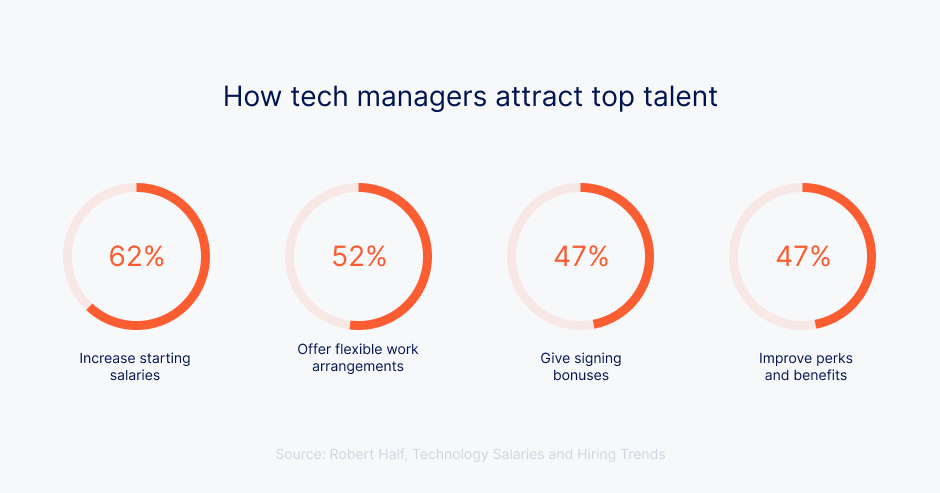
BCG research echoes this resilience, indicating that most tech workers who faced job losses are back to work, predominantly within the tech industry, expressing satisfaction with compensation and roles. Notably, only 22% affected by layoffs were software engineers.
Whether in tech or not, the demand for tech jobs persists. With 61% of hiring managers planning team expansions, competition for candidates remains intense. Technology teams, spanning various industries, are actively pursuing vital projects. Tech hiring needs center around expertise in cybersecurity, cloud, DevOps, digital transformation, security, privacy, development, AI, automation, system upgrades, and data integration and analytics. Many companies will opt for contract professionals to ensure timely project execution.
Also read: 15 less-known benefits of hiring contractors
An AI Bot May Be Your Next Tech Recruiter
What took hours now takes five minutes.
A surge in AI adoption for recruitment is on the horizon, with 35% to 45% of companies embracing AI recruitment tools, according to recent studies. AI proves instrumental in automating hefty tasks such as resume screening, communication outreach, and candidate identification, significantly reducing processing time from hours to minutes.
Talent acquisition leaders acknowledge the efficiency brought by AI. One of the key contributions of AI and ML in recruitment is the automation of administrative tasks like resume evaluation and candidate matching. This allows HR professionals to shift their focus to more human-centric recruitment activities.
AI also augments decision-making quality by leveraging data analysis to predict a candidate's potential success within an organization. This predictive capability minimizes the risk of poor hires, saving time and resources while elevating overall workforce quality.
As AI-crafted resumes become more prevalent, companies will turn to AI screenings for faster, more efficient candidate evaluations. This adoption aims to enhance screening speed, accuracy, and cost-effectiveness compared to traditional methods.
Moreover, AI and ML will revolutionize the candidate experience. AI-powered chatbots and virtual assistants will engage with applicants, answering queries and guiding them through the application process. This will not only ensure a positive candidate journey but also assist HR teams in managing high volumes of inquiries effectively.
Also read: How to make AI part of your tech recruitment strategy
Employers Will Invest in Cybersecurity & Data Engineering
Businesses intensify efforts to safeguard against external threats, leading to a projected global spending of $215 billion on cybersecurity in 2024, a 14.3% increase from 2023, according to Gartner. The Bureau of Labor and Statistics (BLS) predicts a 32% growth in the information security analyst market between 2022 and 2032, outpacing the 14% growth for other tech occupations. This demand surge is fueled by the shift to remote work, the rise of ecommerce, and the substantial expansion of digital health services and telehealth.
In public markets, security emerges as the fastest-growing software category, with companies projecting a 29% expected revenue growth in 2024, surpassing data (DaaS) at 23%. Fintech & SaaS (horizontal) averages ten percentage points lower in expected growth.
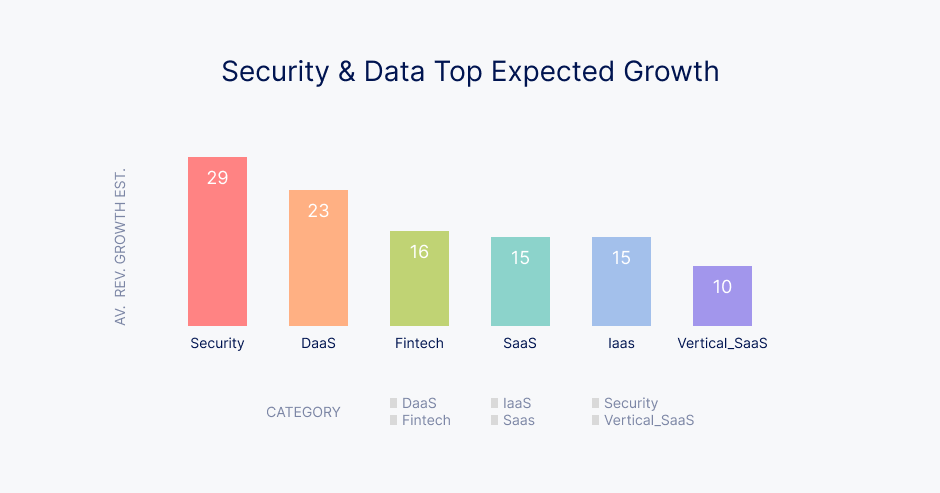
Security and data lead priorities, with an average enterprise-value-to-forward-revenue of 10x, compared to 5x for other categories. These categories are anticipated to grow twice as fast as the overall software market, commanding higher growth rates.
Apart from this, ISC2's survey reveals a shortage of four million cybersecurity workers in 2023, despite a 10% workforce growth the prior year. That same survey revealed that n 94% of respondents reported skills gaps,
of more than 14,000 cybersecurity professionals revealed that 92% of respondents reported skills gaps at their organizations, particularly in cloud computing security, AI/ML, and zero-trust implementation. The primary causes for these gaps are the inability to find individuals with the right skills (44%), challenges in retaining people with in-demand skills (42%), and budget constraints for hiring (41%).
To bridge these gaps, organizations invest in strategies like recruiting skilled workers, upskilling existing staff, and offering flexible work conditions. Certifications such as CompTIA Security+, CISSP, and CEH enhance the standing of software engineers.
Other tech skills trending in 2024 include:
- Cloud computing: Proficiency in AWS, Azure, or Google Cloud is crucial, with a focus on migrating workloads, optimizing costs, and ensuring security.
- Data science & analytics: In-demand skills encompass data mining, machine learning, statistics, and data visualization, with a shift towards cloud-based platforms like AWS SageMaker or Azure Machine Learning.
- Automation and AI: Skills related to Robotic Process Automation (RPA), chatbots, and AI assistant systems are key, emphasizing the implementation of automation solutions and collaboration with new AI technologies.
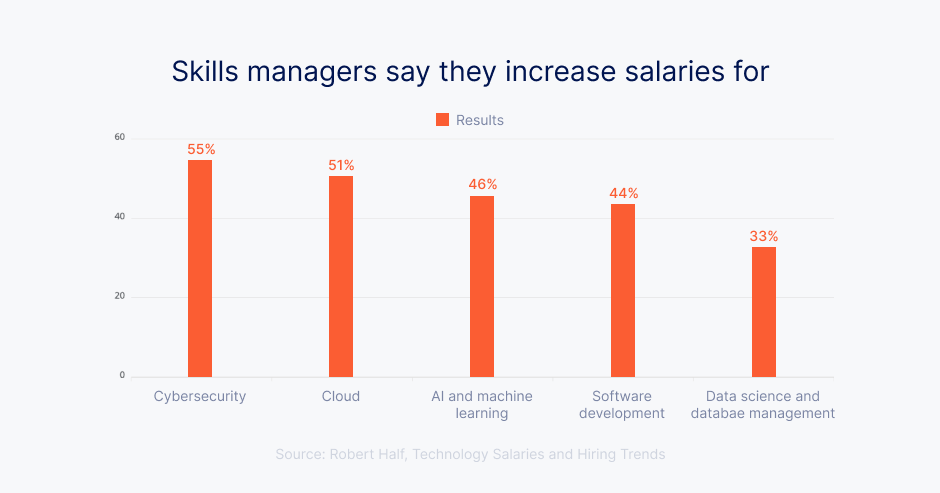
Get matched with senior vetted developers by tapping into a pool of 10,000 pre-vetted tech talent profiles. Get started now →
Upskilling & Reskilling Becomes Mandatory
In the past, completing formal education and securing a job marked the end of learning for many. However, the current landscape demands ongoing re-skilling and upskilling for employees as technology advances and skills evolve. In-demand accreditations and skills include Amazon Web Services (AWS), Certified Agile Leadership (CAL), Certified Information Systems Auditor (CISA), Certified Information Systems Security Professional (CISSP), Cisco certifications, CompTIA A+, Microsoft Azure, and Professional Scrum Master (PSM).
Also read: 13 most sought-after tech certifications for 2024
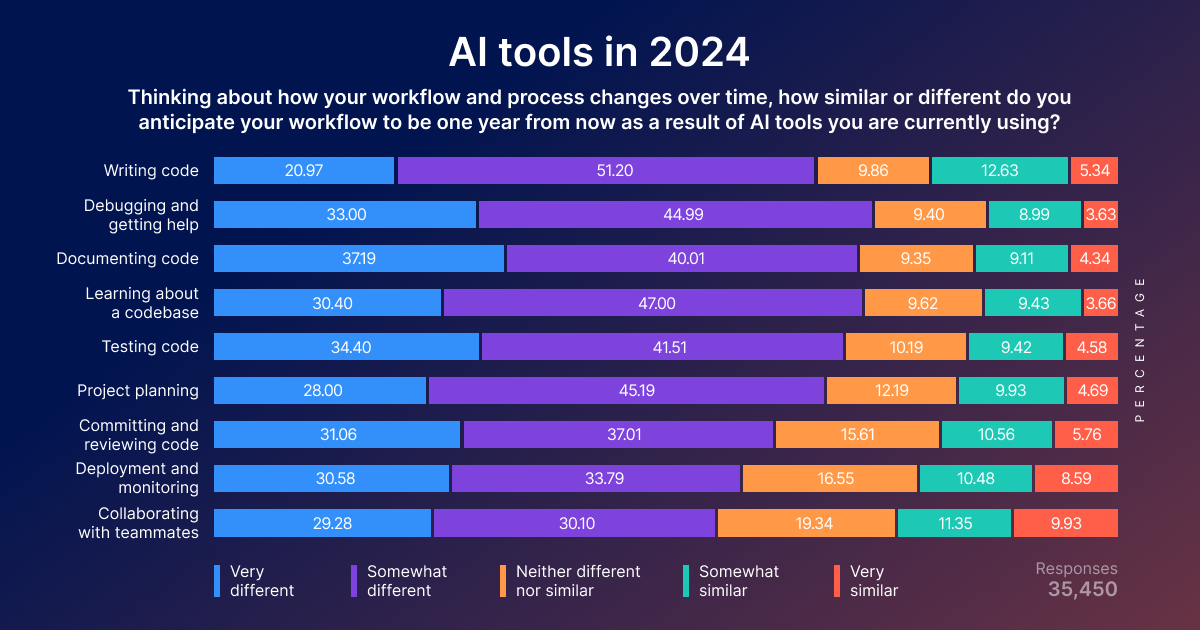
AI is becoming a driving force behind this upskilling trend. AI is prompting individuals to reassess their career paths, while employers take a proactive approach in seeking and nurturing AI-savvy talent.
In contrast, Harvard and Boston Consulting Group assert that millions of workers may require not just upskilling but complete reskilling. Interviews with leaders from 40 global organizations investing in large-scale reskilling programs, unveiled that reskilling is imperative for successful adaptation to automation and AI.
According to a survey from the IBM Institute for Business Value, four out of five executives believe that generative AI will alter employee roles and skills. Executives estimate that 40% of their workforce will need to undergo reskilling due to the implementation of AI and automation over the next three years.
Goldman Sachs estimates that around two-thirds of current jobs are exposed to some degree of AI automation, and generative AI could potentially replace up to one-fourth of current work. While AI might replace some jobs, it also has the potential to create new roles and complement existing ones.
AI won't replace humans; humans using AI will replace humans. Expect the question "What AI tools or Copilot do you use to be a 10x Engineer?" to become common in tech interviews. – Sergiu Matei, CEO & Co-founder
Quick Hiring Process a Significant Advantage
Tech managers are grappling with the challenge of finding top talent, with 90% acknowledging the difficulty. Despite expectations of increased candidate availability due to tech industry layoffs, the reality is different. Job seekers are proactive, and employers slowing down recruitment risk losing skilled candidates.
To counter this, organizations are turning to quick hiring and leveraging contractors through platforms like Index.dev, offshoring, and nearshoring. Such platforms serve as intermediaries, helping tech companies find high-performing remote tech talent they cannot find locally otherwise. Moreover, such platforms provide access to specialized skills efficiently and offer an available pool of remote-ready tech talent, crucial for adapting to the rapid pace of business. Tech remote work platforms, like Index.dev, foster workforce flexibility, allowing organizations to scale up or down as needed. Industries characterized by project-based work or the need for constantly changing skills can benefit the most from this adaptability.
Also read: How Index.dev vet its remote contracting tech talent and matches it to tech companies worldwide
In response to staffing shortages, freelancing challenges, and rising salaries, the U.S. or UK businesses are increasingly relying on remote contractors to fill tech roles. Contract tech talent simply helps work get done with 62% of tech managers planning to bring in more contract professionals for specialized skills and key project support.
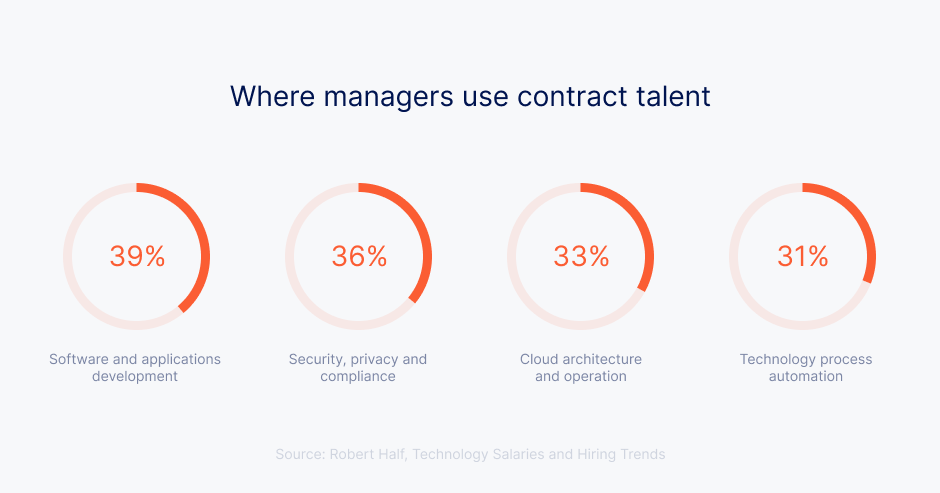
Hiring contractors brings benefits such as cost savings, higher retention, and alignment in time zone, language, and culture.
As a result, Central Eastern Europe and Latin American countries' significant investments in STEM education will strengthen their talent pipelines. The shift toward contracting will reshape assessments and interviews, likely leading to more video-based interactions. Video interviews and assessments enhance recruitment efficiency, eliminating geographical constraints in the era of remote work. Moreover, the use of contract talent will become more prominent in specific areas, like:
- 39% in Software and applications development
- 36% in Security, privacy, and compliance
- 33% in Cloud architecture and operation
- 31% in Technology process automation
Also read: 15 less-known benefits of hiring contractors globally with Index.dev
Summing Up
Top tech talent remains within reach as companies adapt to digital transformation. The demand for expertise in areas such as cloud computing (cloud services, AWS, Azure), AI and machine learning, cybersecurity (infosec, ethical hacking), and blockchain is soaring.
For recruiters:
- Focus on sourcing efforts in high-growth tech areas: LatAm or Central Eastern Europe
- Expand outreach to find diverse, qualified global candidates.
- Intensify recruiting at colleges and coding bootcamps.
- Consider relocation services to facilitate candidate moves.
For job seekers:
- Upskill or reskill through online courses and IT certifications.
- Showcase skills through side projects.
- Master tech certifications to prove your expertise and benefit from higher compensation.
Key Changes:
- Who you hire: Tech companies are reevaluating the balance between AI capabilities and human roles leading to the elimination of certain jobs and the emergence of roles demanding different skill sets.
- How you hire: Changes in skills will impact the hiring process, with AI-polished resumes challenging traditional hiring heuristics.
- Higher expectations from contractors: Tech companies seek quicker ways to tap into the global talent pool and unlock new expertise.
- Remote work default for tech jobs: In 2024, tech companies will persist in backing remote work, tapping into global tech talent pools and offering employees the freedom to work from anywhere.